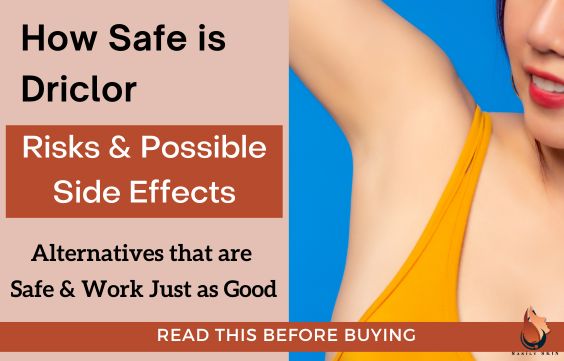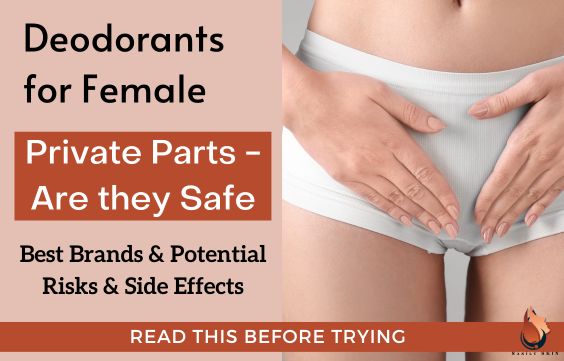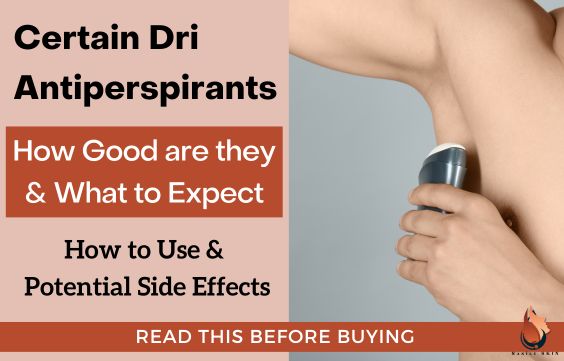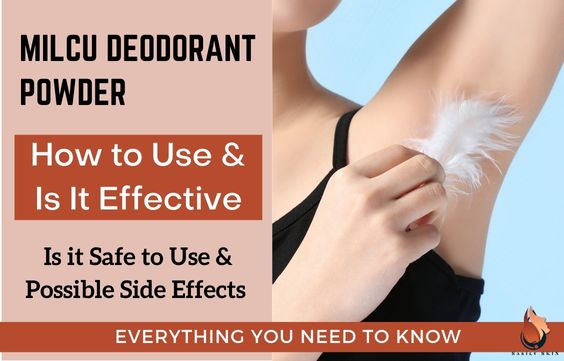Probiotic Deodorants- Benefits, Risks & Reviews
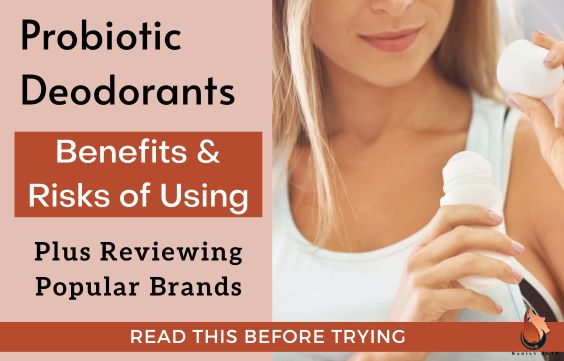
Probiotic Deodorants are a relatively new experiment in the skincare industry. As more and more people are leaning away from traditional antiperspirants and more towards “natural” skincare, researchers and skincare makers are finding new ways to “naturalize” products to try and give you the same effects.
However, this one is a theory that I was not so sure about, so I decided to check a few of them out to see whether they really work or not.
How Probiotic Deodorants Work
Probiotic Deodorants are “natural” deodorant formulas that contain different strains of bacteria that are good for your skin. They are supposed to balance your skin’s microbiome to prevent odor.
Remember that body odor is not caused by sweat alone, but rather by bacteria when they interact with your sweat.
So probiotic deodorants are supposed to deliver good bacteria to the skin to help keep the regular bacteria under control.
Their other ingredients will include things like arrowroot powder, cornstarch, baking soda, essential oils, etc. Basically, similar to those in “natural” deodorants.
Related Article – What are Antibacterial Deodorants & Who Should Use Them
But Are They Really Effective?
Probiotic Deodorants may be more effective for some people than others.
Now here’s the thing, your skin hosts different kinds of bacteria. Different parts of your skin will have different ecologies depending on skin temperature, humidity, pH, and how many sebaceous and sweat glands are present in that area.
For example, different surveys of healthy human skin discovered that oily areas of the skin (the areas with a lot of sebaceous glands) contain mostly Propionibacterium species(and a few others) while moist and humid areas like your underarms, feet, and bends of your elbows contain mostly Staphylococcus and Corynebacterium species (and a few others). Other areas may contain different variations.
So, for companies to create a truly effective probiotic deodorant, they have to make sure that they include a wide variety of the right kinds of bacteria in the right amounts to make sure that they stabilize the environment without causing an infection or disrupting the microbiome negatively. As you can imagine, this can be a challenge.
If you are looking for some other less harsh ways to fight underarm odor consider checking out these articles:
10 Quick & Easy DIY Natural Remedies For Smelly Armpits
Best Essential Oils for Armpits & How to Use Correctly
Reviews and Trials
Based on our trial and many reviews, some brands work better than others, but they work the same as regular natural deodorants.
I was not too excited about messing with the bacteria on my already sensitive skin, but for the sake of my sassy skin clan, I took one for the team and dragged a few of my friends along with me.
When we discussed our experience, we agreed that:
- You will still sweat (this is expected since these are not antiperspirants). So if you sweat a lot, this might not be great for you.
- The texture is a mess. We tried three different brands of probiotic deodorants and they all had dry, crumbly textures that were a mess to apply. If you don’t mind that dry, crumbly feel, then you won’t mind this.
- I am not a big sweater so they kept me relatively dry for most of the regular days. However, on days when I worked out or went out in the sun and sweat more, I stunk by the end of the day. The other ladies had the same experience. We agreed it was similar to some of the regular natural deodorants we tried.
- You will have to reapply them more often, especially if you sweat a lot. If you get a lot of odor and you sweat a lot, then these formulas will not be strong enough to keep you dry and odor-free for more than a few hours.
For a nicer gentle deodorant that works consider Lume Deodorant Review- Is It Really Safe & Side Effects
Related Article: Why Armpits Smell Even With Deodorant & Bathing: How to fix
Benefits Of Using Probiotic Deodorants
As we tried out the probiotic deodorants, here are the benefits that we discovered they have:
- They are natural – even though they have bacteria, they contain more natural ingredients. So if you prefer to skip the chemicals in traditional antiperspirants, these are not a bad choice.
- If you are a light sweater and you do not produce a lot of odor, they will work well for you.
- If you use the right kind of probiotics, this will enhance your skin’s protective barrier and make it healthier.
Now for a great natural deodorant for men check out my article on Dr Squatch Deodorants Review: Are They Worth It
Will probiotic deodorants help with armpit odor?
If you do not sweat a lot and usually do not get much odor, then the right kind of probiotic deodorant will help to keep you odor-free.
Remember that the skin under your arms contains specific strains of bacteria that produce odor. So using a formula with the right composition of bacterial species is important.
Related Article: Cornstarch For Smelly & Sweaty Armpits- Benefits & Risks
Side Effects Of Using Probiotic Deodorants
Since these formulas contain live bacteria, here are a few expected side effects:
- Irritation
- Infection
- Itching
Remember that you are going to be changing the composition of the microbiome of the skin. If the kind of bacteria in the formula is not suitable, you can change the ecosystem too much. This can cause irritation, rashes, itching and even mild surface infections on the skin.
If this happens, stop using the products and see a dermatologist for treatment and medical advice.
Read your product labels and check to see what kind of probiotics are used in the formula. Do your research and look for the ones that contain skin-friendly bacteria. Most products will contain Lactobacillus acidophilus, which is really a gut bacteria. Since they don’t naturally occur on the skin or in the armpits the effect will be minimal or very temporary and can cause a reaction.
Related Article – Using Salt as Deodorant for Smelly Armpits- Is it Effective
The Probiotic Deodorants We Tried
These are the 3 most interesting probiotic deodorants that we found and decided to try:
1- Lavanilla Probiotic Deodorant
This one was the most reviewed probiotic deodorant that we found on Amazon. When I checked out the ingredients list, I noticed it has some bacteria (inulin) and some yeast extracts. Since both microorganisms make up the skin’s microbiome, I decided to give this one a shot.
It wasn’t bad, but it wasn’t magical either. For me, it worked much like a regular natural deodorant. The scent was nice and it lasted a few hours. However, by the time I got home, I was ready to shower. I walked home from the office and I could begin to smell some funkiness from the sweat buildup.
You can Click here to see the Lavanilla Probiotic Deodorant On Amazon.
2- Blume Hug Me Deodorant
This one is popular among a few famous people. It is said to be great for people with sensitive skin as it contains simple ingredients like coconut oil, cornstarch, baking soda, candelilla wax, jojoba seed oil, and the star of the show, Bacillus Coagulans (probiotics).
The kicker here is that the probiotic formula is made of only one bacterial species: Lactobacillus.
However, my friend tried this for a week and gave up. She said that it lasted a few hours if she was doing regular, non-sweaty things. But the minute she started to sweat, she felt like she needed to wash her pits and reapply. After-workout funk was also LOUD!
Click here to see the Blume Hug Me Deodorant.
Related Article: Milcu Deodorant Powder Review – Does It Work & Side Effects
3- Salt & Stone Natural Probiotic Deodorant
This one is not as popular but upon research, it looked quite interesting. It contains tons of skin-moisturizing and soothing ingredients.
However, the “probiotic” formula is made up of primarily Saccharomyces Ferment which comes from the fermentation of saccharomyces. This is a type of yeast that contains several enzymes that bio-converts several funky substances, so it works as a natural deodorant. We were curious to see how it would stand up against odor.
Related Article: Best Salt Crystal Deodorants: Risks, Benefits & How to Use
So we gave this deodorant to one of our sweaty guy friends to see how it would hold up. It did not. As much as we wanted to love it, he did not smell very loveable at the end of the day.
He felt very self-conscious too. It just was not strong enough to keep odor at bay and since it is not an antiperspirant, the sweat just made everything worse. To see if it would hold up better on a less sweaty person, I gave it a shot.
And to be honest, the scent and odor protection was not bad as long as I did not sweat. But by the end of hot days where I did end up sweating, I could smell my own pits when I raised my arms to chest level. Uncomfortable.
Click here to see the Salt & Stone Natural Probiotic Deodorant.
The Bottom Line – Are Probiotics Deodorants Worth It?
It’s a no for me. They have potential, I agree, but they are just not there yet.
More research needs to be done into what the skin’s microbiome is specifically made of. Since this differs for every person and will differ further for different parts of the skin, I can see how this can be difficult.
For a probiotic deodorant to be truly effective, I think it would have to be custom-made to include the right kinds of microorganisms for your skin specifically.
This means you would have to test your skin to figure out what smelly organisms are present, and then request that your deodorant be made with probiotics to suit.
Now, probiotics and other natural deodorants are sometimes already pricey, imagine what the cost of that would be! However, if it could truly work, then I and many others may not mind the splurge.
But for now, I think you can get better results from regular natural deodorants that are more affordable, or if you don’t mind the aluminum in traditional antiperspirants, then just stick to those.
Related Article: Carpe Deodorant Review- Does it Work, Benefits & Effects
Sources
The human skin microbiome | Nature Reviews Microbiology
The Human Skin Microbiome in Selected Cutaneous Diseases
Bad Body Odor? Try Putting More Bacteria Under Your Pits | GQ

